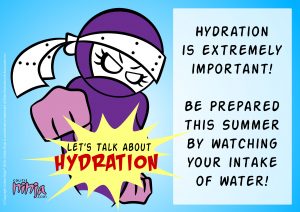Information
The body of a human being is made up of about 57-60% of water on average. Obviously these numbers vary depending on weight and gender, but we all consist of a large portion of water. It is estimated that about 75% of all Americans are chronically dehydrated. Because we are mostly built up of water, staying hydrated is extremely important.

According to the experts at Everyday Health, we lose water when we breathe, sweat and have a bowel movement. Our body is constantly circulating blood and water through your system, and out of your system to keep it functioning properly. Therefore, it is extremely important to replace the water in your system by drinking water and eating foods containing water.
People with chronic illnesses such as Crohn’s disease or ulcerative colitis (Inflammatory Bowel Disease or IBD) should be even more conscious about maintaining hydration. Damage in the intestines will prevent your body from being able to stay hydrated properly. Many people with IBD have also had surgeries to remove a portion of their colon or even their entire colons. These factors make it even more important for patients to pay attention to their water intake!
Many of us… if not most of us… have been hospitalized on dehydration alone. I will never forget the first time I was. I had many of the symptoms:
I went to the ER for it twice that day. The second time they admitted me. I couldn’t even keep ONE sip of water down. And it didn’t help that I kept going to the bathroom and then puking from the pain that BM’s caused. It was absolutely miserable!
I always urge IBD patients to stay on top of their water intake. But it’s even more important during the hot summer months when dehydration puts you at more of a risk. Getting dehydrated also puts you at risk for electrolyte imbalances as well.
So, how can you avoid dehydration? The first thing I would encourage you to do is try to stay on top of symptom management. The quickest way for dehydration to set in is for you to let your symptoms (i.e. diarrhea) go unchecked. I realize that most IBD patients struggle with this, but I just want to remind you to TAKE CARE OF YOURSELF.
Replace your electrolytes. There are so many sports drinks and drink mixes out there that also include electrolytes. Something else you might consider is Himalayan pink salt. This stuff is better than regular table salt because it contains many naturally-occurring nutrients in it already. I use it in all my dishes that call for salt. I also like to add a pinch of it to my water before I drink it.
Monitor your pee. We all know that dark pee is a sign of dehydration. Something else you need to look for is clear pee. This means you might be over-hydrated. What you want is light-yellow pee. This is the easiest way to monitor your hydration. Your body has it’s own way of communicating with you to let you know what it needs. Listen to it!
